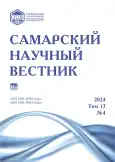Модель формирования качеств вторичной языковой личности экономиста
- Авторы: Боярко С.А.1
-
Учреждения:
- Балтийский федеральный университет имени Иммануила Канта
- Выпуск: Том 13, № 4 (2024)
- Страницы: 118-123
- Раздел: Педагогические науки
- URL: https://bakhtiniada.ru/2309-4370/article/view/284640
- DOI: https://doi.org/10.55355/snv2024134304
- ID: 284640
Цитировать
Полный текст
Аннотация
Целью исследования является моделирование процесса формирования качеств вторичной языковой личности будущего экономиста в контексте профессионально ориентированной образовательной среды. Научная проблема заключается в отсутствии прикладных, методических, организационно-педагогических рекомендаций по формированию качеств будущего специалиста экономической сферы. Таким образом, данная научная статья носит полидисциплинарный характер в силу пересечения педагогической, психологической, экономической научных сфер с будущей профессиональной деятельностью обучающихся. При написании статьи применены методы анализа, синтеза, сравнения, систематизации и моделирования. Обоснованная структура модели включает в себя четыре блока: концептуальный, содержательный, процессуальный, результативный. При построении модели формирования качеств вторичной языковой личности экономиста-профессионала, прежде всего, определены потребности социума и государства, личностные мотивы обучающихся, а также дидактические возможности дисциплины «Иностранный язык» на экономических направлениях подготовки. Педагогическая ретроспекция и обобщение опыта преподавания иностранного языка будущим экономистам, теоретико-методологическая база исследования в качестве основы модели формирования качеств вторичной языковой личности позволили установить составляющие компоненты профессионально ориентированной образовательной среды, реализуемой при психолингвистическом подходе. В содержательном блоке мы углубляемся в понятие вторичной языковой личности, раскрывая ее через качества, которые могут быть сформированы в процессе иноязычной подготовки обучающихся экономических направлений подготовки. Для данной манипуляции нами был проведен научный анализ литературы в области педагогики, психологии, лингводидактики, микро- и макроэкономики на предмет изучения особенностей профессиональной и языковой личности экономиста. Концептуальный и содержательный блоки в совокупности формулируют новизну нашего исследования – построение процесса формирования качеств вторичной языковой личности будущих экономистов-профессионалов на принципах психолингвистического подхода в профессионально ориентированной образовательной среде. Отличительные особенности подготовки студентов высшей школы также отражены в выборке методов и приемов для процессуального блока. Выводы и результат нашего исследования полезен для дальнейшего изучения качеств вторичной языковой личности экономиста-профессионала в вузе и апробации модели формирования качеств вторичной языковой личности студентов высшей школы.
Полный текст
Открыть статью на сайте журналаОб авторах
Светлана Андреевна Боярко
Балтийский федеральный университет имени Иммануила Канта
Автор, ответственный за переписку.
Email: sabojarko1@kantiana.ru
аспирант высшей школы образования и психологии, старший преподаватель высшей школы бизнеса и предпринимательства
РоссияСписок литературы
- Об экспериментальных правовых режимах в сфере цифровых инноваций в Российской Федерации: федеральный закон от 31.07.2020 № 258-ФЗ [Электронный ресурс] // Гарант.ру. https://base.garant.ru/74451176.
- О стратегии научно-технологического развития Российской Федерации: указ президента РФ от 28.02.2024 № 145 [Электронный ресурс] // Гарант.ру. https://base. garant.ru/408618353.
- Об утверждении федерального государственного образовательного стандарта высшего образования – бакалавриат по направлению подготовки 38.03.01 Экономика [Электронный ресурс] // Гарант.ру. https://base.garant.ru/ 74547939.
- Азарова О.А. Формирование и развитие вторичной языковой личности студента в процессе обучения языку специальности // Проблемы современного образования. 2020. № 3. С. 201–206. doi: 10.31862/2218-8711-2020-3-201-206.
- Бельчикова А.А. Формирование вторичной языковой личности как цель современного языкового образования в области иностранных языков // Личность в контексте межкультурного взаимодействия: мат-лы I всерос. молодежной науч. конф. Томск: Изд-во Том. ун-та, 2011. С. 102–104.
- Вардзелашвили Ж.А., Прокофьева Л.П. Становление вторичной языковой личности в пространстве иностранного языка // Филологический класс. 2022. Т. 27, № 4. С. 205–216.
- Бударина А.О. Методология и технологии формирования профессиональной универсальности лингвистов: автореф. дис. … д-ра пед. наук: 13.00.08. Калининград, 2011. 50 с.
- Емельянова Ю.Н., Хмырова О.А. Критерии оценки сформированности качеств личности в процессе подготовки будущих спортивных тренеров // Проблемы современного педагогического образования. 2023. № 78–3. С. 91–94.
- Одишелашвили И.Р., Кириллова Т.С., Кошелева О.Н. Профессиональная языковая личность в сфере медицины // Астраханский медицинский журнал. 2010. Т. 5, № 4. С. 55–57.
- Родина Н.А. Психологический аспект языковой личности российского военнослужащего: коммуникативная ономастическая составляющая // Неофилология. 2020. Т. 6, № 21. С. 101–110. doi: 10.20310/2587-6953-2020-6-21-101-110.
- Claros M.S.C. Psycho-linguistic and socio-cultural approaches to language learning: a never ending debate // Colombian Applied Linguistics Journal. 2008. № 10. P. 142–154. doi: 10.14483/22487085.102.
- Field J. Psycholinguistics. The key concepts. London: Routledge, 2004. 366 p.
- Бударина А.О. Профессиональная универсальность лингвиста: к обоснованию понятия // Вестник Российского государственного университета им. И. Канта. 2010. № 11. С. 72–80.
- Боярко С.А. Психолингвистический подход к формированию качеств вторичной языковой личности будущих экономистов [Электронный ресурс] // Мир науки. Педагогика и психология. 2024. Т. 12, № 5. https:// mir-nauki.com/70pdmn524.html.
- Архангельский С.И. Лекции по научной организации учебного процесса в высшей школе. М.: Высшая школа, 1976. 200 с.
- Афанасьев В.Г. Моделирование как метод исследования социальных систем // Системные исследования: Методологические проблемы. Ежегодник. М.: Наука, 1982. С. 26–46.
- Беспалько В.П. Основы теории педагогических систем: проблемы и методы психолого-педагогического обеспечения технических обучающих систем. Воронеж, 1977. 304 с.
- Романова Л.Ю. Педагогическое обеспечение профессионально-нравственного саморазвития учителя в условиях общеобразовательного учреждения: автореф. дис. … канд. пед. наук: 13.00.01. Казань, 2011. 22 с.
- Сластенин В.А., Исаев И.Ф., Шиянов Е.Н. Педагогика: учеб. пособие / под ред. В.А. Сластенина. М.: Издательский центр «Академия», 2002. 576 с.
- Писаренко В.И. Педагогические модели: типология и особенности // Проблемы современного образования. 2024. № 1. С. 58–76. doi: 10.31862/2218-8711-2024-1-58-76.
- Загвязинский В.И. Теория обучения: современная интерпретация: учеб. пособие. 3-е изд., испр. М.: Издательский центр «Академия», 2006. 192 с.
- Краевский В.В. Методология педагогического исследования: пособие. Самара: Изд-во СамГПИ, 1994. 165 с.
- Подласый И.П. Педагогика: учебник. 3-е изд., перераб. и доп. М.: Юрайт, 2020. 576 с.
- Халеева И.И. Вторичная языковая личность как реципиент инофонного текста // Язык – система. Язык – текст. Язык – способность. М.: Институт русского языка РАН, 1995. С. 277–286.
- Крупченко А.К., Кузнецов А.Н. Основы профессиональной лингводидактики: монография. М.: АПКиППРО, 2015. 240 с.
- Крупченко А.К., Медведева Т.Ю., Папуткова Г.А. Аксиологические стратегии реформирования иноязычного профессионального образования // Высшее образование сегодня. 2023. № 4. С. 10–16.
Дополнительные файлы







